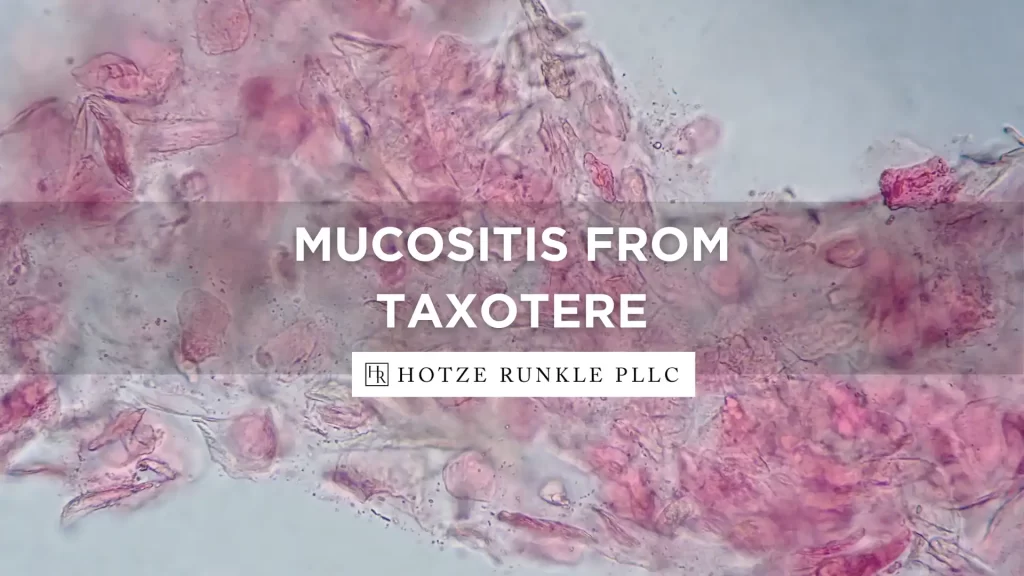
Most patients know that many cancer treatments, such as chemotherapy, can have adverse side effects. However, when pharmaceutical companies fail to disclose the extent of the harm their drugs can cause, patients can experience significant and unnecessary stress, pain, and loss of quality of life.
At Hotze Runkle PLLC, our experienced attorneys have spent years working diligently to inform and support cancer patients who have experienced severe side effects due to the chemotherapy drug Taxotere (docetaxel). While we have previously focused primarily on severe side effects like canalicular stenosis and permanent hair loss (alopecia), we also want to raise awareness of another potentially debilitating Taxotere side effect: mucositis.
If you have developed mucositis due to Taxotere treatments, the skilled and knowledgeable lawyers at Hotze Runkle PLLC are here to help. Call us today at (800) 763-6155 for a free consultation, or take our online quiz to learn more about your legal options.
How Does Taxotere Work?
Taxotere is a chemotherapy drug from a class of medications called taxanes. Since 1996, it has been used to treat various types of cancer, including:
- Breast cancer
- Lung cancer
- Prostate cancer
- Stomach cancer
- Head and neck cancers
Taxotere works by inhibiting the growth and division of cancer cells, ultimately leading to cell death. While this is a desired outcome in cancer treatments, it can also negatively affect healthy cells, possibly resulting in severe side effects.
What Is Mucositis?
Mucositis is the painful inflammation and ulceration of the mucous membranes that line the digestive tract. This condition most commonly affects the mouth (oral mucositis) and throat. Mucositis can cause difficulty swallowing, eating, and speaking, leading to malnutrition, dehydration, and reduced quality of life. It can also increase the risk of infection, as internal ulcers and open sores provide gateways for bacteria and other pathogens to enter the bloodstream.
How Does Taxotere Cause Mucositis?
Taxotere, like other chemotherapy drugs, targets rapidly dividing cells. While this is effective in killing cancer cells, it can also harm healthy cells that naturally divide quickly, such as those in the lining of the mouth, throat, and gastrointestinal tract. When Taxotere damages these cells, it can lead to mucositis symptoms, including inflammation, ulcers, and sores.
Mucositis affects 20 to 40 percent of patients who receive chemotherapy for solid tumors. The severity of mucositis among Taxotere patients can vary depending on factors such as the dosage of the drug, the duration of treatment, and individual patient factors. Some patients might experience only mild symptoms, while others suffer from severe, debilitating mucositis that significantly affects day-to-day life.
How Does Mucositis Affect Cancer Patients?
Mucositis can profoundly impact cancer patients’ lives, affecting their physical, emotional, and social well-being. Some of the ways mucositis can affect cancer patients include:
- Pain – Mucositis can cause severe pain, making it difficult for patients to eat, drink, or even speak. This extreme discomfort can lead to malnutrition, weight loss, and dehydration, all of which can hinder the healing process and overall recovery prospects.
- Infection – Open sores and ulcers from mucositis increase the risk of infections such as cellulitis, herpes simplex virus (HSV), and oral candidiasis (thrush). Cancer patients are already at a higher risk for infections due to their weakened immune systems, making this complication even more concerning.
- Treatment delays – Severe mucositis might require adjustments to cancer treatment plans, including delaying or reducing chemotherapy doses. This could potentially reduce the overall effectiveness of chemotherapy.
- Emotional distress – The pain and discomfort caused by mucositis can lead to feelings of depression, anxiety, and isolation, further affecting patients’ quality of life.
If you have suffered significant personal or financial losses due to the side effects of Taxotere. You should speak to an experienced attorney at Hotze Runkle PLLC as soon as possible to find out whether you might qualify for compensation.
How to Treat Mucositis After Cancer Treatment
 Mucositis has no specific cure, but your medical team can help you take several steps to alleviate symptoms and promote healing. Treatment options for mucositis might include:
Mucositis has no specific cure, but your medical team can help you take several steps to alleviate symptoms and promote healing. Treatment options for mucositis might include:
Pain Management
Over-the-counter pain relievers, such as acetaminophen or ibuprofen, can reduce mild to moderate pain from mucositis. Prescription medications, such as opioids, steroid injections, or topical anesthetics, might be necessary for more severe pain.
Oral Hygiene
Maintaining good oral hygiene is crucial to preventing infections and promoting healing. Patients should brush their teeth gently with soft-bristled toothbrushes, use alcohol-free mouthwashes, and avoid irritating foods and beverages to prevent the aggravation of symptoms.
Topical Treatments
Special mouthwashes, gels, or sprays can soothe and protect the delicate tissues in the mouth and throat, reducing the severity of certain mucositis symptoms.
Cryotherapy
Sucking on ice chips or using cold packs during chemotherapy treatments could reduce the risk of developing or worsening oral mucositis by temporarily constricting blood vessels and limiting the exposure of oral tissues to the chemotherapy drug.
Nutritional Support
Patients with mucositis can take nutritional supplements or make dietary modifications to ensure they receive adequate nutrition despite the pain and difficulty swallowing.
Additional Therapies
Healthcare providers might sometimes recommend additional treatments, such as low-level laser therapy, to manage mucositis symptoms and promote healing.
Patients must work closely with their healthcare teams to develop comprehensive treatment plans tailored to their needs and symptoms.
Contact Hotze Runkle PLLC for More Information
If you or someone you love has experienced severe mucositis as a side effect of Taxotere treatments, the dedicated team at Hotze Runkle PLLC is here to help. Having thoroughly researched the negative side effects of Taxotere, we understand the physical and emotional challenges that mucositis can cause. Our attorneys believe you deserve justice and fair compensation for your suffering.
Hotze Runkle PLLC‘s experienced Taxotere lawsuit attorneys are committed to holding drug manufacturers accountable for failing to adequately warn patients about the known risks associated with Taxotere, including the risk of conditions like mucositis. Our attorneys have recovered more than $100 million in compensation for our clients, and we will work diligently to secure the money you deserve, too.
Contact Hotze Runkle PLLC at (800) 763-6155 for a free, no-obligation consultation, or take our online quiz today to learn whether you might have grounds for a Taxotere lawsuit.